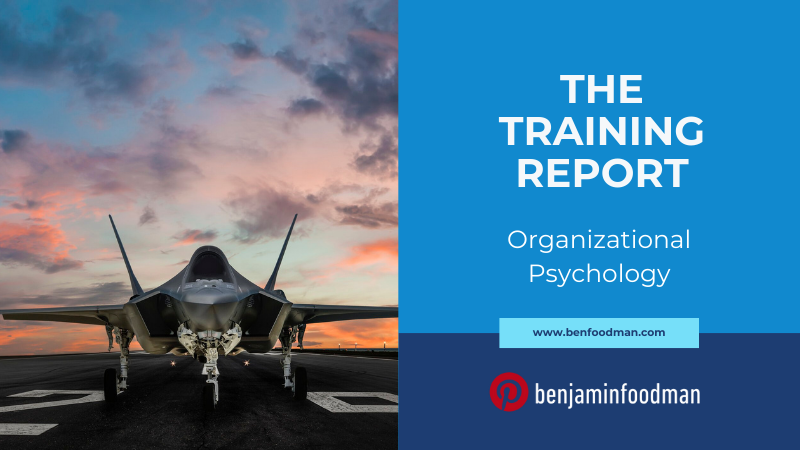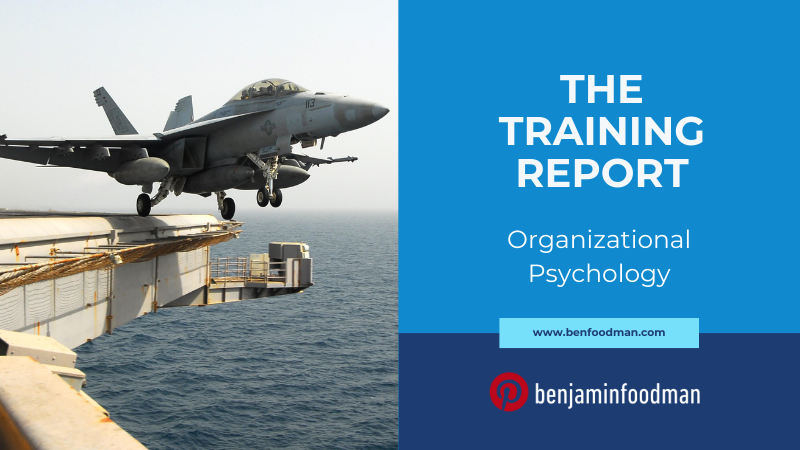Organizational Psychology - Leadership Development Strategies
About the Author
Ben Foodman is a licensed psychotherapist & performance specialist. He owns his private practice located in Charlotte North Carolina where he specializes in working with athletes to help them overcome mental blocks (the yips), PTSD, ADD / ADHD and achieve flow states through the techniques of Brainspotting & Neurofeedback. If you are interested in services, use the link here! Enjoy the article below!
Introduction: Corporate Athletes, Organizational Psychology & Military Doctrine
Last year in January of 2020 I was afforded the opportunity to experience landing on the USS Nimitz via a COD (Carrier Onboard Delivery), stay overnight to observe flight operations, learn about aircraft carrier capabilities, and leave by a catapult launch (launching a plane from 0 - 160 mph in 2 seconds). I wrote extensively about this in one of my previous Training Reports which I highly encourage you to read. During my brief time on the USS Nimitz, I was introduced to a system that I believe separates the United States military capabilities from other foreign armed forces divisions. This system didn’t involve advanced weaponry, or new stealth technology. Rather, it was a system that was designed to produce leadership qualities amongst all members of the ship. This system (or culture) has been forged through hard lessons learned by the United States Navy ever since its’ inception and has been tested at the highest intensities of combat.
While the US private sector has a wide variety of businesses that have unique cultures instilled into their daily operations, throughout my consulting work with different organizations I have found that some of the most unique aspects of United States Navy’s leadership development are frequently missing from some of these spaces. Because I believe different organizations and teams have so much to benefit from by adopting some of these tactics, for this Training Report I am going to discuss with you some of the leadership development strategies that I saw aboard the Nimitz, while also reviewing organizational psychology tactics that your team/business can adopt in order to develop leadership potential amongst your employee/corporate athlete ranks. Let’s first begin by exploring what mentorship is, how the Navy appears to implement this process throughout their ranks and how you can apply this within your organization.
Part I. Leadership, Mentorship & Corporate Athletes
During my trip aboard the USS Nimitz, our civilian group was brought to the bridge to observe flight deck operations from the elevated position. As the officer was explaining the different roles that sailors had on the bridge, he pointed out how the young sailor currently steering the ship was in his early twenties. Most civilians such as myself probably have a preconceived notion of an adult well within their mid to late forties being tasked with the responsibility of moving a multi-billion dollar warfighting vessel throughout the Pacific ocean while FA-18 Super Hornets and Lockheed Martin F-35 Lightning II Jets are landing and launching off of the ship’s flight deck. This was astonishing to me as you would be hard pressed to find a civilian company that would allow a new, 20 year old employee to have a significant point of influence in determining the literal course of direction of a multi-billion dollar organization. Clearly there was some form of mentorship/supervision at play here, and this experience taught me a valuable lesson that civilian companies should take to heart when establishing the culture of their organization: no matter who you hire within your team, you will only be as successful as the system you have in place to develop leadership qualities amongst your tribe’s members. But what is mentorship and how is this related to leadership development?
Mentorship can be defined as the guidance provided by a mentor, especially an experienced person in a company or educational institution. In the instance of the young sailor steering the aircraft carrier, he was surrounded by other peers and senior officers who at one point earlier in their careers had been in the same position he was, and were providing support along with intensive learning opportunities for this person to both improve and develop into a valued member of the team. As impressive as this may seem, there were countless moments throughout my observation aboard the Nimitz where younger individuals were tasked with critical responsibilities. For instance within the ship’s engineering department there were sailors (also in their early twenties) who were disassembling and reassembling FA-18 engines for repairs before their next scheduled flights. Entry level employees in your average American business would be unlikely to find similar opportunities of this magnitude. Again, highly effective and tactical mentorship was playing a critical role through all of this. So with that being said, what are tangible strategies that organizations can implement when developing a mentorship program to enhance leadership? Let’s begin with a first step of what I refer to as identifying core processes.
Part II. Organizational Psychology & Mission Statements
Like the subconscious, a core process can be an individual’s peripheral psychological system that regulates many different behaviors. Our core process is part of our consciousness process which is not readily in focal awareness. This secondary layer allows us to automatically go through certain routines without having to extract excessive energy while also filtering in new information during our daily receptive and expressive language processing (how we are receiving information and communicating information to others). While our core process may not necessarily be visibly apparent, if we can identify what it is then we can actually make alterations to it. For instance we don’t necessarily think about how we breathe on a regular basis but when brought to our full awareness, we can actually change that behavior. But we can only help members of a team identify their individual core processes if we ask the right questions and avoid distractions.
One of the biggest mistakes I see corporate leaders make is that they focus too much on individual actions and mistakes rather than what is driving those behaviors. I usually refer to this as subject diversion. An example of this would be if a member of the team consistently turns in inadequate work, and the initial reaction of team leader is to focus on fixing the individual event instead of trying to identify the core process that is driving these types behaviors. There are several communication strategies that team leaders can implement to identify core processes: First, ask open ended questions when trying to identify core processes rather than close ended questions (e.g. what do you think is preventing you from turning in completed work?); second, recognize that the subject diversion is only the first step towards understanding the core process, don’t over focus on fixing individual diversions; finally, ask team members what they believe their individual purpose is and why they chose to accept your invitation to join your team. Once you have identified these core processes, the next step of mentorship is to establish goals.
Part III. Corporate Athletes & Goal Setting
Once you have identified your individual team member’s core process, you have helped conceptualize the energy resource needed to drive their efforts. But in order to truly maximize on this newfound momentum, you need to help bottleneck that energy into production. The best way to do this is to construct three levels of goals within your mentorship program: outcome goals; performance goals; and process goals. Outcome goals are large, long-term goals that resemble the final metaphorical ‘finish line’. In order to accomplish those outcome goals, several performance goals need to be identified which focus on ‘improvements relative to an individual team member’s past performance results’. Finally, process goals should be constructed which conceptualize the specific procedures needed to properly execute performance outcome goals. If the core process is the fuel, then the three levels of goal setting are the car and the GPS. So why is this mentorship structure ideal for leadership development?
In order to become an effective leader, an individual must possess confidence in both themselves and their mission directives. By having an established mentorship program, team members or new individuals within a group are able to both assimilate into the team’s culture through observation from senior members, learn complex job functions, and are also being able to forge their individual motivations and skills within the organization’s mission. Identifying core processes, not being distracted by subject diversion, and establishing three layers of goal setting can efficiently help all team members develop these desired qualities and contribute towards effectively executing the mission. There are many methodologies within the field of industrial organizational psychology that can be used to develop leadership qualities, but through my personal experiences consulting and observing elite performers, I have found that this system will be highly effective and adaptable for many different teams.
Note To Reader:
If you are an athlete reading this segment of the TRAINING REPORT, hopefully this content was helpful! I put the Training Report together because I felt like many of the discussions on issues such as the Yips/mental blocks, strength training & other subject matter on athlete performance concepts were really missing the mark on these ideas (e.g. how trauma is the direct cause of the Yips). If you are interested in learning more, make sure to subscribe below for when I put out new content on issues related to sport psychology & athlete performance! Also, if you are looking to work with a mental performance specialist, you are in the right place! USE THIS LINK to reach out to me to see if my services are the right fit for your goals!
ARE YOU ON THE LIST?
Make sure you’re signed up to Ben’s mailing list to receive news & updates on new strategies in sport psychology, upcoming workshops & products. Don’t wait, sign up now!

















